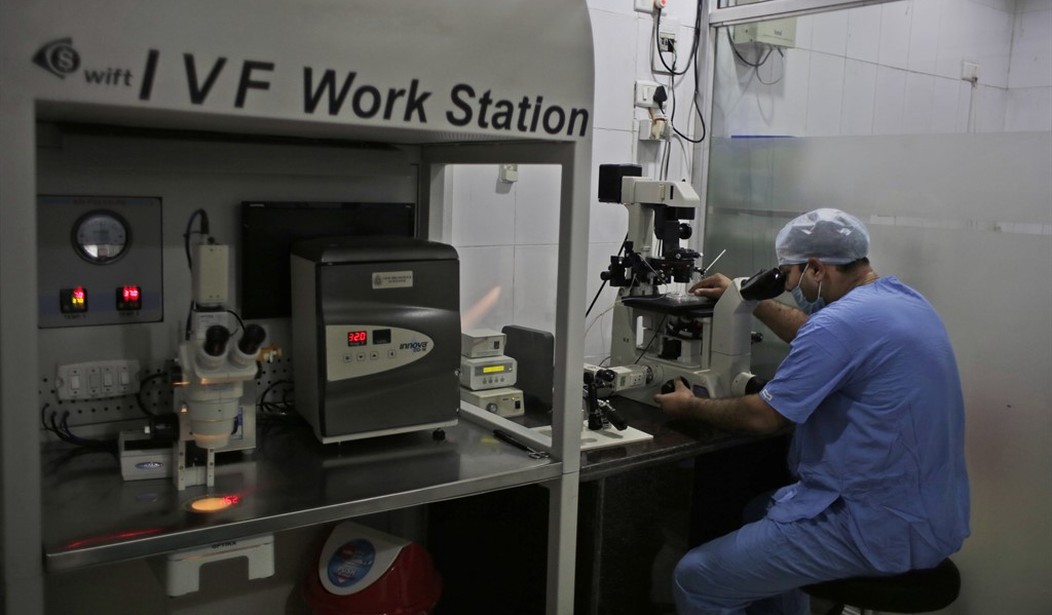“Test tube babies” used to be a punchline to a thousand jokes (“The best thing about being a test tube baby? You get a womb with a view.”) The things geneticists and biologists are now able to do to a human embryo were the stuff of science fiction just 20 or 30 years ago.
It’s definitely not a joke.
The revolution in human reproductive technology isn’t exactly happening under the radar. Ethicists have been wrestling with the radical changes in technology for many years. In some ways, the ability to manipulate genes — removing ones that cause disease while “turning on” genes that enhance characteristics like IQ — is an attempt to redefine the reproductive experience.
If you can afford it, a new world is opening up — a world that will turn out “superior” humans. And the real question? Will we still be “human” when all is said and done.
Many think genetic enhancement will be a wonderful thing. In some ways, it might be. But if the old-fashioned way of making babies becomes a thing of the past, we may come to miss it for more than sentimental reasons. Natural selection has a way of eliminating traits that aren’t necessary for survival or reproduction. Studies of cave-dwelling animals that have become blind suggest that the responsible mutations were strongly favored by selection. Whether such a process would knock out sexuality in humans over centuries or millennia is hard to say, and there is also the wild card of what a much more technologically advanced society might be able or willing to do. But unless ethical concerns or further biological tinkering turns us back, we will have set ourselves on a trajectory—perhaps slow, perhaps not so slow—of losing an aspect of our nature even more fundamental than our intellect.
At the very least, our ability to manipulate genetic characteristics will cause us to question many things about society. Will it be fair that only those with the means to pay the $12,000 to $15,000 fee get to take part in this wondrous revolution? And if the government is to pay for it, do we want health bureaucrats making choices like this?
Recommended: DISGRACEFUL: Biden Admin Has Lost One-Third of Illegal Alien Kids, Who May Now Be in the Hands of Traffickers
The entire issue is fraught with booby-traps like this.
There are further prospects for reproductive technology that pose an even more immediate threat to sexuality. These include the production of both sperm and eggs from the mature cells of a person of either sex. If thousands of viable eggs can be harvested in a single batch, then the expected gain from polygenic screening will be more than doubled. The clear and present danger to sexuality, however, comes from the elimination of the biological requirement of having a father and mother. Same-sex couples could have biological children. Once the necessity and desirability of natural conception have been undone, the immemorial bond that has made the sexes one flesh could be dissolved, leaving behind two alienated “species” with little in common.
We probably know someone close to us — a relative, a good friend — who is desperate to have children and will do whatever it takes for that to happen. That’s what in vitro fertilization was originally purposed to do: help parents unable to conceive through sex.
But this would allow any yuppie with a big bank account to get a leg up on most of the rest of us by choosing the advantageous genetic characteristics that would give their child an edge.
There are intangibles that could still derail the prospects of a genetically enhanced child. The unknowns include the love and care given by both a mother and a father to enhance their child’s well-being. All the genetic changes in the world won’t substitute for the nurturing bond between a child and its parents. It may be that genetic manipulation only gives a child the opportunity to excel; it’s not a certainty.
For that, you still need a mother’s care and a father’s concern to guarantees success.










